#The Racist Roots of American Policing: From Slave Patrols to Traffic Stops
Text
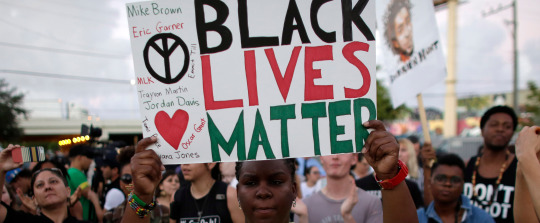
Outrage over racial profiling and the killing of African Americans by police officers and vigilantes in recent years helped give rise to the Black Lives Matter movement.
But tensions between the police and black communities are nothing new.
There are many precedents to the Ferguson, Missouri protests that ushered in the Black Lives Matter movement. Those protests erupted in 2014 after a police officer shot unarmed 18-year-old Michael Brown; the officer was subsequently not indicted.
The precedents include the Los Angeles riots that broke out after the 1992 acquittal of police officers for beating Rodney King. Those riots happened nearly three decades after the 1965 Watts riots, which began with Marquette Frye, an African American, being pulled over for suspected drunk driving and roughed up by the police for resisting arrest.
I’m a criminal justice researcher who often focuses on issues of race, class and crime. Through my research and from teaching a course on diversity in criminal justice, I have come to see how the roots of racism in American policing – first planted centuries ago – have not yet been fully purged.
Slave Patrols
There are two historical narratives about the origins of American law enforcement.
Policing in southern slave-holding states had roots in slave patrols, squadrons made up of white volunteers empowered to use vigilante tactics to enforce laws related to slavery. They located and returned enslaved people who had escaped, crushed uprisings led by enslaved people and punished enslaved workers found or believed to have violated plantation rules.
The first slave patrols arose in South Carolina in the early 1700s. As University of Georgia social work professor Michael A. Robinson has written, by the time John Adams became the second U.S. president, every state that had not yet abolished slavery had them.
Members of slave patrols could forcefully enter anyone’s home, regardless of their race or ethnicity, based on suspicions that they were sheltering people who had escaped bondage.
The more commonly known precursors to modern law enforcement were centralized municipal police departments that began to form in the early 19th century, beginning in Boston and soon cropping up in New York City, Albany, Chicago, Philadelphia and elsewhere.
The first police forces were overwhelmingly white, male and more focused on responding to disorder than crime.
As Eastern Kentucky University criminologist Gary Potter explains, officers were expected to control a “dangerous underclass” that included African Americans, immigrants and the poor. Through the early 20th century, there were few standards for hiring or training officers.
Police corruption and violence – particularly against vulnerable people – were commonplace during the early 1900s. Additionally, the few African Americans who joined police forces were often assigned to black neighborhoods and faced discrimination on the job. In my opinion, these factors – controlling disorder, lack of adequate police training, lack of nonwhite officers and slave patrol origins – are among the forerunners of modern-day police brutality against African Americans.
Jim Crow Laws
Slave patrols formally dissolved after the Civil War ended. But formerly enslaved people saw little relief from racist government policies as they promptly became subject to Black Codes.
For the next three years, these new laws specified how, when and where African Americans could work and how much they would be paid. They also restricted black voting rights, dictated how and where African Americans could travel and limited where they could live.
The ratification of the 14th Amendment in 1868 quickly made the Black Codes illegal by giving formerly enslaved blacks equal protection of laws through the Constitution. But within two decades, Jim Crow laws aimed at subjugating African Americans and denying their civil rights were enacted across southern and some northern states, replacing the Black Codes.
For about 80 years, Jim Crow laws mandated separate public spaces for blacks and whites, such as schools, libraries, water fountains and restaurants – and enforcing them was part of the police’s job. Blacks who broke laws or violated social norms often endured police brutality.
Meanwhile, the authorities didn’t punish the perpetrators when African Americans were lynched. Nor did the judicial system hold the police accountable for failing to intervene when black people were being murdered by mobs.
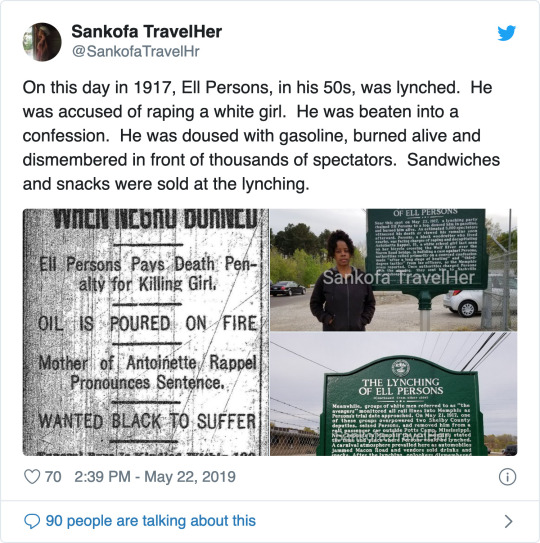
Reverberating Today
For the past five decades, the federal government has forbidden the use of racist regulations at the state and local level. Yet people of color are still more likely to be killed by the police than whites.
The Washington Post tracks the number of Americans killed by the police by race, gender and other characteristics. The newspaper’s database indicates that 229 out of 992 of those who died that way in 2018, 23% of the total, were black, even though only about 12% of the country is African American.
Policing’s institutional racism of decades and centuries ago still matters because policing culture has not changed as much as it could. For many African Americans, law enforcement represents a legacy of reinforced inequality in the justice system and resistance to advancement – even under pressure from the civil rights movement and its legacy.
In addition, the police disproportionately target black drivers.
When a Stanford University research team analyzed data collected between 2011 and 2017 from nearly 100 million traffic stops to look for evidence of systemic racial profiling, they found that black drivers were more likely to be pulled over and to have their cars searched than white drivers. They also found that the percentage of black drivers being stopped by police dropped after dark when a driver’s complexion is harder to see from outside the vehicle.
This persistent disparity in policing is disappointing because of progress in other regards.
There is greater understanding within the police that brutality, particularly lethal force, leads to public mistrust, and police forces are becoming more diverse.
What’s more, college students majoring in criminal justice who plan to become future law enforcement officers now frequently take “diversity in criminal justice” courses. This relatively new curriculum is designed to, among other things, make future police professionals more aware of their own biases and those of others. In my view, what these students learn in these classes will make them more attuned to the communities they serve once they enter the workforce.
In addition, law enforcement officers and leaders are being trained to recognize and minimize their own biases in New York City and other places where people of color are disproportionately stopped by the authorities and arrested.
But the persistence of racially biased policing means that unless American policing reckons with its racist roots, it is likely to keep repeating mistakes of the past. This will hinder police from fully protecting and serving the entire public.
#The Racist Roots of American Policing: From Slave Patrols to Traffic Stops#american policing#slave catchers#police#fuck the police#acab#racism with a badge and gun#white supremacy#systemic racism#racial profiling#racist roots#Black Codes
10 notes
·
View notes
Text
Where are we now? Why are conversations about racial, social, and cultural inequity important at this moment?
Critical Race Theory Panic: What’s Really Behind It? More Perfect Union (Video, 10 min)
Why Cities are still segregated [6-minute video] (NPR Code Switch)
Goodman, Moses, & Jones (2012) ‘Race and Education’ in Race: Are we so different?
Eliza Shapiro, ‘Segregation Has Been the Story of New York City’s Schools for 50 Years’ in NYTimes, March 26, 2019
Ed Week, What is Critical Race Theory and Why is it Under Attack? and Map: Where Critical Race Theory is Under Attack
PBS News Hour, ‘Don’t Say Gay’ law brings worry, confusion to Florida schools
Therese Quinn and Erica Meiners, ‘Seneca Falls, Selma, Stonewall: Moving beyond equality’ in Rethinking sexism, gender and sexuality, pp. 27-37
Optional:
Matt Birhold, ‘Racial Capitalism and the Structural Roots of White Nationalism’
Connie Hassett-Walker, ‘The Racist Roots of American Policing: From Slave Patrols to Traffic Stops’, The Conversation, June 2020
The Daily podcast, The Debate Over Critical Race Theory, [33 minute podcast]
The Advancement Project, ‘We came to learn: America’s history of policing students of color’
Rethinking Schools, ‘Black Students’ Lives Matter’, pp. 16-21
Class Resources
0 notes
Text
John Oliver's comprehensive explanation of the rot in US policing
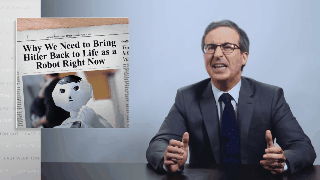
Understanding the reasons for US policing's out of control, violent racism is hard, because there are so many factors at play. First, there's policing's root in "slave patrols" - white supremacist vigilantes who hunted Africans who'd escaped bondage.
https://theconversation.com/the-racist-roots-of-american-policing-from-slave-patrols-to-traffic-stops-112816
Then there's "qualified immunity," a judge-made legal doctrine that means that it's virtually impossible to hold a cop legally responsible for corrupt and violent misdeeds, up to and including murder.
https://pluralistic.net/2020/05/29/mind-control-skepticism/#qualified-immunity
Add to that police unions, all-powerful criminal syndicates who immunize even the worst, most brutal cops from being fired or even disciplined, almost without limits. Unsurprisingly, police unions are correlated with murders committed by cops.
https://www.npr.org/2020/06/05/871298161/police-unions-and-police-violence
There's the fact that cops are basically the only public service left in many cities, serving as social workers, mental health professionals, and youth workers.
https://pluralistic.net/2020/06/02/broken-windows/#broken-windows
There's the militarization of police, a scheme cooked up by military suppliers to goose sales of war-fighting weapons to the military, who pass them on to local cops, turning cities into literal war-zones.
Don't forget "broken windows," a criminological fraud that led to bust quotas for cops, who met them by repeatedly and continuously harassing brown and Black people and anyone else whose complaints don't get a hearing.
https://pluralistic.net/2020/06/02/broken-windows/#broken-windows
And on top of THAT: US structural racism, "warrior" training for cops, and even police departments who literally ban anyone who's "too intelligent" from signing up to be a cop:
https://pluralistic.net/2020/06/08/the-last-federated-platform/#derp-badge
So many toxic threads, snarled together in a terrible knot. However, John Oliver is here with a 33-minute segment that unpicks many of these threads, in admirable and clear fashion.
https://www.youtube.com/watch?v=Wf4cea5oObY
If you lack time/inclination for a 33-minute segment, then please spare a few minutes for Kimberley Jones's superb, self-described "rant," which closes out the segment.
https://twitter.com/kimlatricejones/status/1269733575374647303
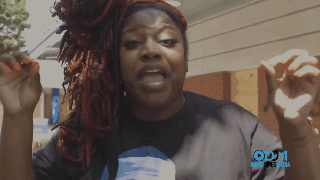
2K notes
·
View notes
Text
the racist roots of American policing
When a Stanford University research team analyzed data collected between 2011 and 2017 from nearly 100 million traffic stops to look for evidence of systemic racial profiling, they found that black drivers were more likely to be pulled over and to have their cars searched than white drivers. They also found that the percentage of black drivers being stopped by police dropped after dark when a driver’s complexion is harder to see from outside the vehicle.
https://getpocket.com/explore/item/the-racist-roots-of-american-policing-from-slave-patrols-to-traffic-stops?utm_source=pocket-newtab
0 notes
Photo

The Racist Roots of American Policing: From Slave Patrols to Traffic Stops — The Free Thought Project The persistence of racially biased policing means that unless American policing reckons with its racist roots, it is likely to keep repeating mistakes of the past. The Racist Roots of American Policing: From Slave Patrols to Traffic Stops — The Free Thought Project
0 notes
Link
“In addition, law enforcement officers and leaders are being trained to recognize and minimize their own biases in New York City and other places where people of color are disproportionately stopped by the authorities and arrested.
But the persistence of racially biased policing means that unless American policing reckons with its racist roots, it is likely to keep repeating mistakes of the past. This will hinder police from fully protecting and serving the entire public.”
0 notes
Photo

The racist roots of American policing: From slave patrols to traffic stops
0 notes
Link
0 notes
Text
What to do about the police
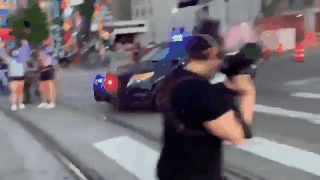
US police brutality stories raise a lot of important structural questions about how policing works here. How can a law-enforcement system repeatedly produce so many spectacularly lethal outcomes? What kind of idiotic operation are cops running, anyway?
I mean, how do cops with long histories of violent misconduct stay on the force? How do cities end up shelling out millions to bail out violent and crooked cops, and then those cops get to keep their jobs and reoffend until their body-count crosses some threshold?
What kind of police force produces officers who literally drive down the street indiscriminately gassing unarmed people with their hands in the air?
https://www.reddit.com/r/DemocraticSocialism/comments/gssq9s/casually_pepper_spraying_out_the_window_as_you/
Criminal defense attorney T Gregg Doucette lays out fifteen concrete structural deficits in US policing that explain much (but not all) of the violence, corruption and impunity that characterize American policy violence and discrimination.
https://twitter.com/greg_doucette/status/1266053291684827138
Doucette starts with "qualified immunity" - a judge-created doctrine that effectively excuses almost any police misconduct, no matter how blatant it is. Under QI, cops who commit crimes can't be sued if the crime wasn't "clearly established" at the time.
This superficially reasonable idea is, in fact, a license to commit any crime. Like, California cops who stole $100K in gold coins were not punished because no statute said "Don't steal gold coins" (the statutes merely said "Do not steal").
As Doucette says, "If a police officer chokes someone to death for sport, you'd say 'killing for sport is illegal!' Then a judge'd say 'just killing them with his shin, not with his knee.'"
And the double-whammy of QI is that it keeps suits from being brought, which keeps evidence from being entered into the record, which keeps "clear definitions" from being generated, which means that cops can repeatedly engage in the same midconduct without sanction.
Doucette moves on to other structural issues in US policing, like the fact that cops don't need to carry malpractice insurance, so, on the one hand, there's no difference between the cost of employing a repeat offender vs a cop with a squeaky-clean record.
And on the other hand, taxpayers have to shell out millions to make amends for crimes committed by cops.
Other issues: cops are undereducated, hired young, don't need to live in the neighborhoods they police.
And police departments aren't required to publish "Brady lists" of cops whom prosecutors have documented as serial liars who cannot be called upon to testify.
Police unions cut "sweetheart deals" with cities that worsen these deficiencies by tying the city's hands when cops commit crimes.
More: De-escalation is not a mandatory part of police training (quite the contrary, cops are trained and equipped for "domestic warfare").
Cops are allowed to use traffic stops as a pretense for fishing expeditions and this power is primarily targeted against people of color.
The arresting cop is also the investigating the crime - so the arresting officer is incentivized to plant evidence, lie, etc, to "win."
Federal prosecutors are extremely reluctant to prosecute cops, even repeat offenders who commit murder. Amy Klobuchar did not prosecute George Floyd's murderer when he committed other assaults on the people he was sworn to protect.
https://www.theguardian.com/us-news/2020/may/28/george-floyd-killing-officers-derek-chauvin-tou-thao-investigated
There is no reliable, comprehensive database of police violence and killing. You can't respond to problems if you're not measuring them.
Centuries of court decisions have riddled the 4th, 5th and 8th Amendments with loopholes, leaving the Bill of Rights in tatters.
Doucette: "For example, at the federal level the Supreme Court has ruled it's totally 100% fine for the police to violate your Fourth Amendment rights as long as they do so 'in good faith.'"
Penalties for crimes committed while wearing a badge are weaker than the penalties for the same crimes when committed by "civilians" (a term I despise, cops should not be a military force). They should be more harsh.
I said at the start of this thread that Doucette's list of structural deficiencies in US policing is incomplete, and I'm sure he'd agree with me. One important point to raise in the context of the racist elements of US police malpractice is the origin of US policing.
American policing is rooted in "Slave Patrols" - literally vigilante forces whose job was to return Africans who'd escaped enslavement to the monsters who'd enslaved them.
https://theconversation.com/the-racist-roots-of-american-policing-from-slave-patrols-to-traffic-stops-112816
It's conceivable that an institution could overcome roots as blighted as this, but that is a huge, deliberate undertaking. It's not something that happens automatically if you ignore it long enough.
So to Doucette's excellent list of reforms, I'd add one more: a frank, well-funded, wide-ranging truth and reconciliation process to explicitly grapple with America's white supremacist history and its connection to law enforcement.
I'm pretty confident that Doucette would agree with this one. After all, he spearheaded the campaign that forced the UNC to abandon its plans to hand millions of dollars to a white nationalist group to build a Klan museum.
http://pulse.ncpolicywatch.org/2020/02/13/silent-sam-settlement-scrapped-but-questions-remain/
144 notes
·
View notes
Text
Diligent Procrastination Case Study 002: The Racist History of American Police
(Watch) https://youtu.be/TlOOsgqC3CA
ACAB Crewneck Sweatshirts for sale at The Scarlet Carson:
http://www.thescarletcarson.shop/product/acab-sweatshirt
http://www.thescarletcarson.shop/product/acab-scoreboard-sweatshirt
100% of profits go to Critical Resistance, a national grassroots organization working to abolish the prison industrial complex. (criticalresistance.org)
References and Sources:
Grandin, G. (2019, January 12). The Border Patrol Has Been a Cult of Brutality Since 1924. Retrieved June 15, 2020, from https://theintercept.com/2019/01/12/border-patrol-history/
Hassett-Walker, C. (2020, June 08). The racist roots of American policing: From slave patrols to traffic stops. Retrieved June 15, 2020, from https://theconversation.com/the-racist-roots-of-american-policing-from-slave-patrols-to-traffic-stops-112816
@theslacktivists on Instagram https://www.instagram.com/p/CBBg2v7hCxQ/
Violence in Minneapolis is rooted in the history of racist policing in America: Police violence against African Americans has persisted for centuries by Keisha N. Blain (The Washington Post, May 30)
Gordon Parks’s 1960s Protest Photos Reflect the Long History of Police Brutality in the United States by Daria Harper in Artsy.
Throughline [< American Police]. (2020, June 03). New York, New York: NPR.
Stop-and-Frisk Data. (2020, March 11). Retrieved June 15, 2020, from https://www.nyclu.org/en/stop-and-frisk-data
The March, 1963 (Restored)
The History of Policing in the US (PDF)
0 notes
Link
Half a century after the federal government voided Jim Crow laws, the criminal justice system still discriminates against African Americans. http://bit.ly/2MARdpP
0 notes
Text
After Jim Crow, broken windows

US policing has been racist from the start. The first US police forces were vigilante "Slave Patrols" charged with returning liberated Africans to the monsters who'd enslaved them.
https://pluralistic.net/2020/05/29/mind-control-skepticism/#qualified-immunity
So any discussion of the anti-Black violence of US policing must begin with this fact.
https://theconversation.com/the-racist-roots-of-american-policing-from-slave-patrols-to-traffic-stops-112816
But it shouldn't end there.
Over the years, the character and intensity of US police racism has changed, and there are identifiable, proximate causes for those changes. Undoing those changes will not eliminate racism from policing, but it will dampen the danger it poses.
In 2017, Matt Taibbi wrote a furious book about the NYPD's daylight murder of Eric Garner, called "I Can't Breathe."
https://boingboing.net/2017/12/15/eric-garner-rip.html
In it, Taibbi examines the role that "broken windows" policing and data-driven police quotas played.
https://taibbi.substack.com/p/where-did-policing-go-wrong
"Broken Windows" came from a 1982 article in The Atlantic by the academic corrections official George Kelling, who claimed that people "feel safer" when the streets are swept of panhandling, litter, graffiti, etc.
The Broken Windows theory was endorsed and spread by the famed Stanford psych researcher Philip "Obedience Experiment" Zimbardo, who wrote, "If a window in a building is broken and left unrepaired, all of the rest of the windows will soon be broken."
The promise of an easy answer to crime was incredibly tempting for mayors and police chiefs, who imposed quotes on rank-and-file officers, demanding that they stop, search and ticket a minimum number of people for low-level offenses every day.
But there's a problem with that. If you stop-and-frisk wealthy, influential, connected people, they will sue you for human rights violations, go to the newspapers, and make your life hell.
To meet quotas, cops had to find people who weren't entitled to complain when their rights were violated.
Black people.
This is the origin of the modern, data-driven epidemic of overpolicing. In 2004, the city of Baltimore saw 100,000 petty crime arrests that met and exceeded Mayor Martin O'Malley's targets. By 2014, Chicago PD had stopped 250,000 people in a single year.
The culture of "goal setting" and "deliverables" existed in irreconcilable tension with the inability of the police to visit stop-and-frisk and constant traffic stops on the white majority. Something had to give. That something was Black lives.
America became the great incarcerator, as Clinton's Crime Bill gave rise to long sentences for the people busted by cops looking to hit their targets.
As Taibbi writes today, "We have two systems of enforcement in America, a minimalist one for people with political clout, and an intrusive one for everyone else."
https://taibbi.substack.com/p/where-did-policing-go-wrong
This is why NYC had to pay $33,000,000 in restitution for ONE HUNDRED THOUSAND strip-searches performed on people facing misdemeanor charges. These searches don't merely reflect sadism - they're also a way of creating new charges, like "resisting arrest." It's a twofer.
It's why cops - correctly - came to understand that the people they were policing hated them and saw them as an occupying army.
Lucky for them, that was around the time military contractors successfully lobbied for a program of low-cost "surplus" sales of military equipment to local law.
That's when we started to see cops dressing up like infantry on patrol in Mosul. "Dress for the job you want."
Broken windows was a fraud, and "community policing" (the euphemism for stop-and-frisk) never worked. But it lumbers on as a zombie "fact" whose research was long discredited, claiming Black lives in its wake.
https://www.propublica.org/article/in-new-york-crime-falls-along-with-police-stops
"In upscale white America drug use is effectively decriminalized, and Terry stops, strip searches, and 'quality of life' arrests are unknowns. The country isn’t going to heal as long as everyone else gets a knee in the neck."
47 notes
·
View notes
Text
The Racist Roots of American Policing: From Slave Patrols to Traffic Stops
The persistence of racially biased policing means that unless American policing reckons with its racist roots, it is likely to keep repeating mistakes of the past.
United States (Conversation) – Outrage over racial profiling and the killing of African Americans by police officers and vigilantes in recent years helped give rise to the Black Lives Matter movement.
But tensions between the police and black communities are nothing new.
There are many precedents to the Ferguson, Missouri proteststhat ushered in the Black Lives Matter movement. Those protests…
View On WordPress
0 notes